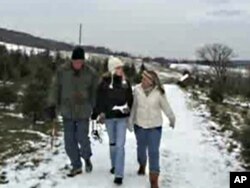On a chilly December afternoon, the Sylvester family heads to Snickers Gap Tree Farm, about an hour west of Washington, D.C., to choose and cut down the perfect Christmas tree.
Decorating the Christmas tree - usually a pine decorated with lights and ornaments - is one of the traditions which makes the holiday season special.
The Sylvesters spend 45 minutes out in the cold, wandering among the groves comparing trees. When they find their favorite - a three-meter-tall beauty as wide as daughter Elsa's outstretched arms - they cut it down themselves. Then they drag it across the snowy field to the cash register, where they pay about $100 for the priviledge.
It doesn't have to be this way.
Many roadside lots spring up at this time of year, selling pre-cut trees for half or a third as much. Hardware stores and other places sell them, too.
And artificial trees are becoming increasingly popular. About 12 million reusable plastic trees sold last year, up from about 10 million in 2003.
In an age where cost and convenience drive many purchasing decisions, asking customers to pay more to cut their own Christmas tree seems like a bad business model.
But choose-and-cut Christmas tree farms remain the most popular place for Americans to buy a tree, accounting for a third of sales.
"Our business is as robust as it can possibly be," says Snickers Gap owner Steven Wolff. "I don't see the artificial trees as, currently, a threat to what we're doing."
An artifical tree "is not what Christmas is about," Elsa says.
And the family clearly enjoys spending the time together outside. They take pictures and play in the snow.
"It's more special," says Elsa, whose family has come to chop down their own tree. "It's fun."
Her mom, Amy, agrees. It's about "memories, good times," she says. Wolff's father started the farm in the 1980s. "My dad always said it was about the experience, not the tree," he says. "Everyone's so involved with things that don't connect them anymore with nature and the Earth. And I think this is one thing that people enjoy doing."
And for many Americans, it's a family experience that makes the extra effort worthwhile.





